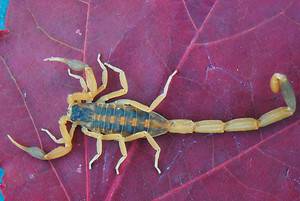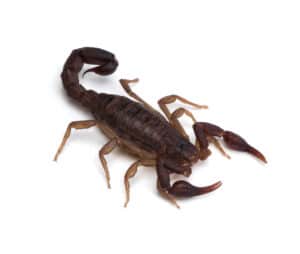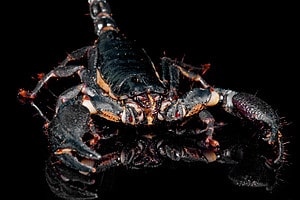Do you know if scorpions are nocturnal or diurnal? Do they sleep at all? How do they sleep? If you are curious about the sleep behavior of scorpions, read on. We share what we learned about their sleep habits and discuss some of the possible reasons behind them. After reading this post, you will be far better informed about the sleep behavior of scorpions.
What Are Scorpions?
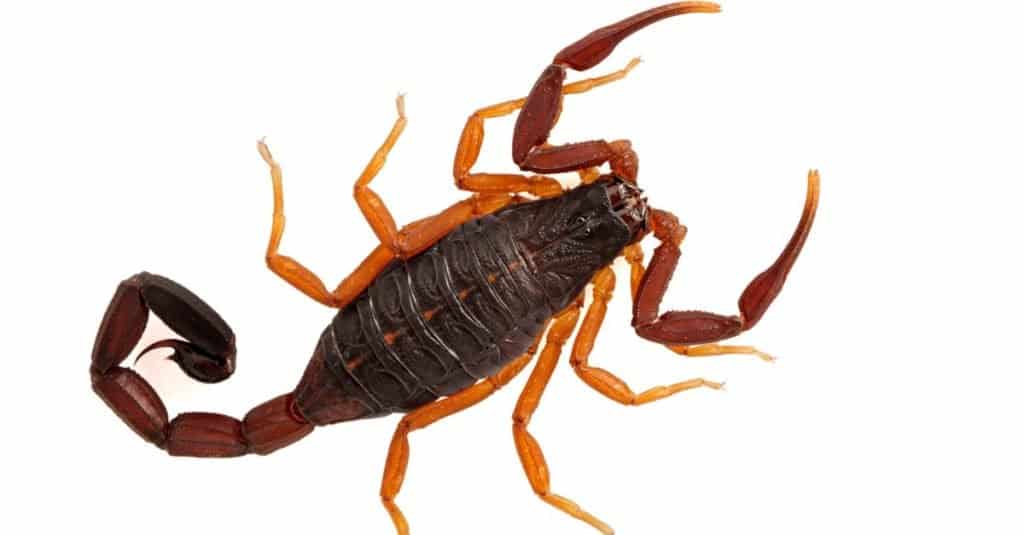
Are scorpions nocturnal or diurnal? Scorpions are nocturnal creatures that are well-adapted to nighttime hunting.
©Ernie Cooper/Shutterstock.com
Scorpions are a class of arachnids characterized by their trademark long, segmented tails and large pincers. Although often associated with danger and deadly venom, most scorpions (with some exceptions) pose minimal risk to humans. Instead, they feed on small insects and other invertebrates, making them an essential part of the local food chain.
Although people may be somewhat familiar with their dietary habits, they are typically less knowledgeable about specific other behavior patterns. For instance, are scorpions nocturnal, diurnal, or cathemeral? Whatever their behaviors, some vary quite dramatically depending on the species and environment.
Some scorpion species burrow underground most of the year, only leaving their dens occasionally to mate, hunt, or give birth. Other species prefer to stay closer to the surface, building temporary burrows with wood and stones.
Despite these differences in behavior, what truly defines all scorpions is their ability to thrive in even the harshest conditions. Whether it’s bone-dry deserts or dark forests shrouded in mist and moss, scorpions will always be there exploring and thriving.
The Activity and Sleep Behavior of Nocturnal Scorpions
As scorpions are nocturnal animals, they tend to be most active at night, roaming around their habitats in search of food and other resources. During the day, scorpions typically hide in their burrows, remaining still and well-protected from predators. However, as darkness begins to fall and their environment becomes quieter, these fascinating creatures come out to explore.
And though many scorpions tend to show signs of slowing down and entering a period of inactivity before dawn, some may continue to move around during this time. Overall, scorpions’ activity and sleep behavior are intriguing aspects of their complex and fascinating biology.
Why Are Scorpions Nocturnal?
Scorpions are well-known for their nocturnal habits, prowling the desert and open grasslands under the cover of night. But what exactly drives them to stay active at night? Several different reasons can contribute to this behavior.
One major factor is water conservation. Scorpions need relatively little water to survive but still need to drink regularly. During the day, when it is hot and dry, they risk losing too much moisture by moving around. At night, however, they don’t have to worry much about perspiring or drying out. Focusing their activity in the nocturnal hours allows scorpions to spend more time actively hunting and less time recovering from the heat.
Another factor is temperature management. Like all animals, scorpions must maintain a healthy body temperature to function correctly. But due to their relatively low metabolic rate and exoskeleton structure, it can be challenging for them to avoid overheating during the hot daytime hours. At night, however, staying active becomes much more manageable when temperatures drop slightly below the deadly range for these creatures.
Finally, there is also the fact that scorpions are primarily ambushing predators. Due to this hunting tactic, nocturnal scorpions rely on surprise to successfully catch their prey. By becoming active at night and scuttling quietly through the shadows, these arachnids can close in on unsuspecting prey without alarming them. This ambush technique gives them an undeniable advantage over other predators in their environment. These factors make a strong case for why scorpions prefer nocturnal activity over daylight roaming.
Where Do Scorpions Live During the Day?
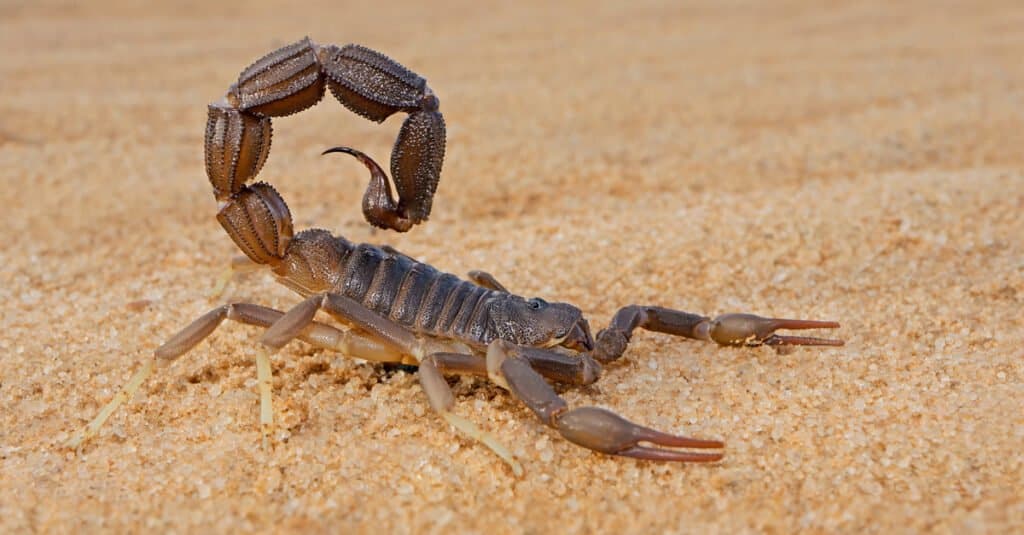
Scorpions must conserve their energy and protect themselves by hunting at night to prevent dehydration.
©EcoPrint/Shutterstock.com
Scorpions are fascinating arachnids that live worldwide, including in many parts of the United States. While they are most active at night, scorpions must find shelter during the day to avoid dehydration and escape predators. This requirement generally means that scorpions seek out shady, protected areas where they can remain undisturbed until nighttime.
Some common daytime hiding spots for scorpions include under rocks, piles of wood, and tree bark. These areas provide shelter and a steady source of moisture, which is essential for their survival. Additionally, some species of scorpions have adapted to being upside down during the day’s heat. You may find these species on the undersides of garden furniture or other outdoor structures where they can more easily ambush their prey.
All in all, it’s essential to be aware of potential hiding spots for scorpions in your yard. Knowing some of their favorite hideouts can help you protect yourself and your family against possible stings. Nonetheless, with proper vigilance and a healthy respect for these fantastic creatures, you can enjoy watching them from a safe distance without risk.
What Is Sleep Like for Scorpions?
Sleep is an essential part of life for all living creatures, including scorpions. Studies show that sleep in scorpions is not a constant state. Instead, nocturnal scorpion sleep consists of two separate parts: alert immobility and relaxed immobility. During alert immobility, the scorpion remains tightly coiled and maintains a high level of arousal while its heart rate stays elevated. In contrast, relaxed immobility decreases arousal levels and heart rate.
Research also demonstrates that resting scorpions involve mechanisms similar to those in mammals and other vertebrate species. After being deprived of sleep for 12 hours, a scorpion will compensate for the lack of rest with increased alert and relaxed immobility. Consequently, sleep in scorpions plays an essential role in overall health and well-being. Whether this rest serves as a recovery or memory consolidation is still under investigation. Still, one thing is sure; no creature can function at its best without rest.
Do Scorpions Hibernate?
Many species of scorpions go into a type of hibernation state in colder months. This state of dormancy allows them to conserve energy and minimize their need for oxygen. They will sometimes even go into warm houses and find dark crevices to endure the winter.
However, scorpions can adapt to various environments and conditions, including extreme heat and cold. In particular, some species of scorpion can survive frigid temperatures by employing unique physiological mechanisms that allow them to survive in icy weather. Studies also show that these cold-tolerant scorpions rapidly develop ice crystals in their bodies in response to subzero temperatures.
This ability triggers specific adaptive mechanisms that help the animal survive this stressful condition. Despite the extreme nature of these freezing temperatures, many of these tough scorpions can regroup and recover from the experience. Thus, it is clear that scorpions possess a unique ability to adapt and thrive even in harsh icy conditions.
Nocturnal Scorpion Eyes
The eyes of nocturnal scorpions are uniquely adapted to help them hunt in the darkness of the night. These creatures have specialized vibration-sensing hairs on their pedipalps called trichobothria that allow them to feel even the slightest movement in their environment. Additionally, they have a complex vision system comprised of multiple pairs of eyes that let them see even when conditions are dim.
Besides, the nocturnal scorpion’s eye position is essential in navigating at night. Their central eyes are on the top of the cephalothorax, near the creature’s sensory organs. This positioning ensures these arachnids can use starlight reflected off the ground to orient themselves and avoid obstacles. So, despite their relative lack of visual acuity compared to humans, scorpions are remarkably adept at navigating their complex environments at night using sight.
Fluorescence of Nocturnal Scorpions
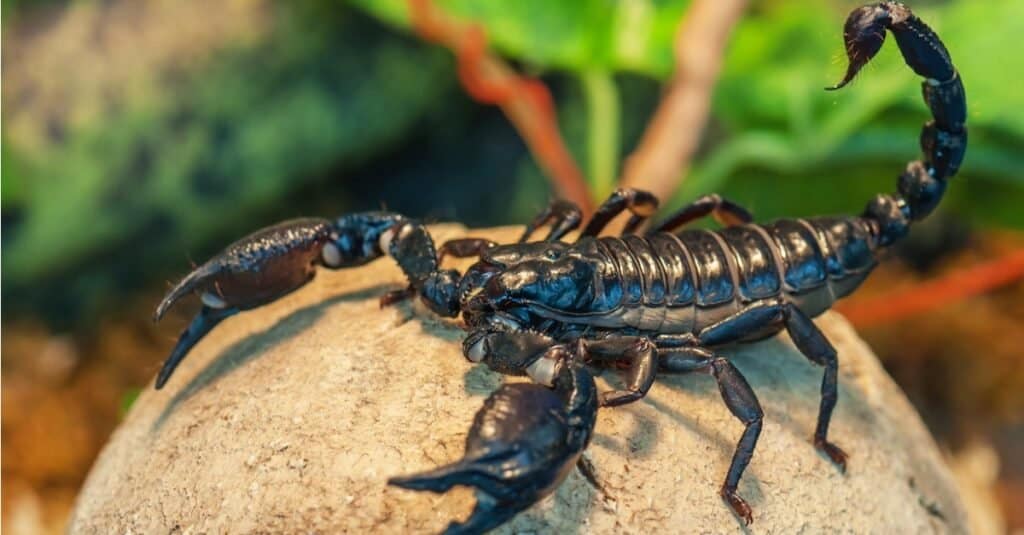
Nocturnal scorpions have well-developed eyesight but also fluoresce under UV light, supporting their
hunting skills
.
©Vova Shevchuk/Shutterstock.com
Perhaps most interestingly, many species of scorpion fluoresce under UV light. This superpower allows them to detect better the silhouettes of potential prey moving through the darkness. As a result, these skilled predators are ideally suitable for successful hunting in their nocturnal habitats. Whether lurking beneath rocks or slithering through long grass, scorpions are true predators of the night. Add the scorpion’s adaptive nocturnal vision and extraordinary sensitivity, and you have an amazing predator.
Nocturnal vs. Diurnal: What’s The Difference?
Navigate to Nocturnal vs. Diurnal: What’s The Difference? for further information about the nocturnal and diurnal phenomenon in various living creatures.
Up Next – More About Scorpions
- Bark Scorpion
- The 10 Largest Scorpions In The World
- Discover the Ancient Sea Scorpion with a Deadly Spiked Tail
- What Do Scorpions Eat?
The photo featured at the top of this post is © iStock.com/lamyai
Sources
- Springer Nature, Available here: https://www.nature.com/articles/ncomms3602
- The University of Chicago Press Books, Available here: https://www.journals.uchicago.edu/doi/abs/10.1086/physzool.58.5.30158580?journalCode=physzool
- ScienceDirect, Available here: https://www.sciencedirect.com/science/article/pii/S0149763414002474
- Springer Nature, Available here: https://link.springer.com/article/10.1007/BF00612431
- Britannica, Available here: https://www.britannica.com/animal/scorpion/Ecology-and-habitats#ref47763
Thank you for reading! Have some feedback for us? Contact the AZ Animals editorial team.



